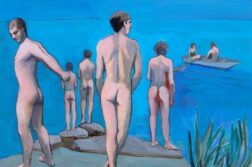IT WAS IN EARLY MAY, 2001, that I got the news that I had been granted a Fulbright scholarship in India. The award for a lecturer in women’s studies seemed like a perfect fit. Yet my excitement was tempered with a little concern about what life in India would be like for a lesbian, a feminist, and a woman traveling alone. I wondered if I would feel out of place as one of a very few Westerners in Lucknow, a large but somewhat remote city in northern India. As it turned out, I was the only American at Isabella Thoburn College, where I was to live and lecture for six months.
When I arrived at the airport terminal, two of the college faculty members, Pooja and Nalini, Indian women dressed very elegantly in richly colored silk saris, greeted me. They seemed so formal and serene, and so cool in what to me was intense heat and humidity. In a way, they reminded me of the nuns I had as teachers when I was a child. Maybe it was their gracefulness and their economy of movement (necessitated by the sari) that reminded me of the nuns in their old, long habits. They supervised the transport of my luggage to the car but otherwise waited for things to be done for them by workers. We exchanged pleasantries and they offered condolences for 9/11, which had occurred just a few days earlier. I wondered what, if anything, I might have in common with these women, who seemed so feminine, so traditional. I need not have worried: within a few minutes Pooja, who would become my closest friend, embarked on a discussion of feminist issues, and I began to feel a little at home.
As I got to know my colleagues and students, I began to develop a sense of community at the college. And yet the longer I remained in India, the more I realized how superficial and fragile those bonds were—superficial in that our ability to truly understand each other was limited by our differences in culture and experience, which were vast; and fragile because I felt that a misstep on my part could threaten my ability to establish bonds of acceptance and belonging.
Patricia J. Ould, a sociologist, spent six months in India as a Fulbright Scholar at Isabella Thoburn College in Lucknow.






Discussion1 Comment
Perhaps it was on one of my many trips to India that I heard this story regarding lesbians in India.
When Queen Victoria was consulted on the forming of laws and regulations to be applied to the newly organized Indian government, the question of homosexuality arose. Males were subjected to penalties but not women. The Queen claimed that women “did not due that sort of thing” so no laws against them were necessary.